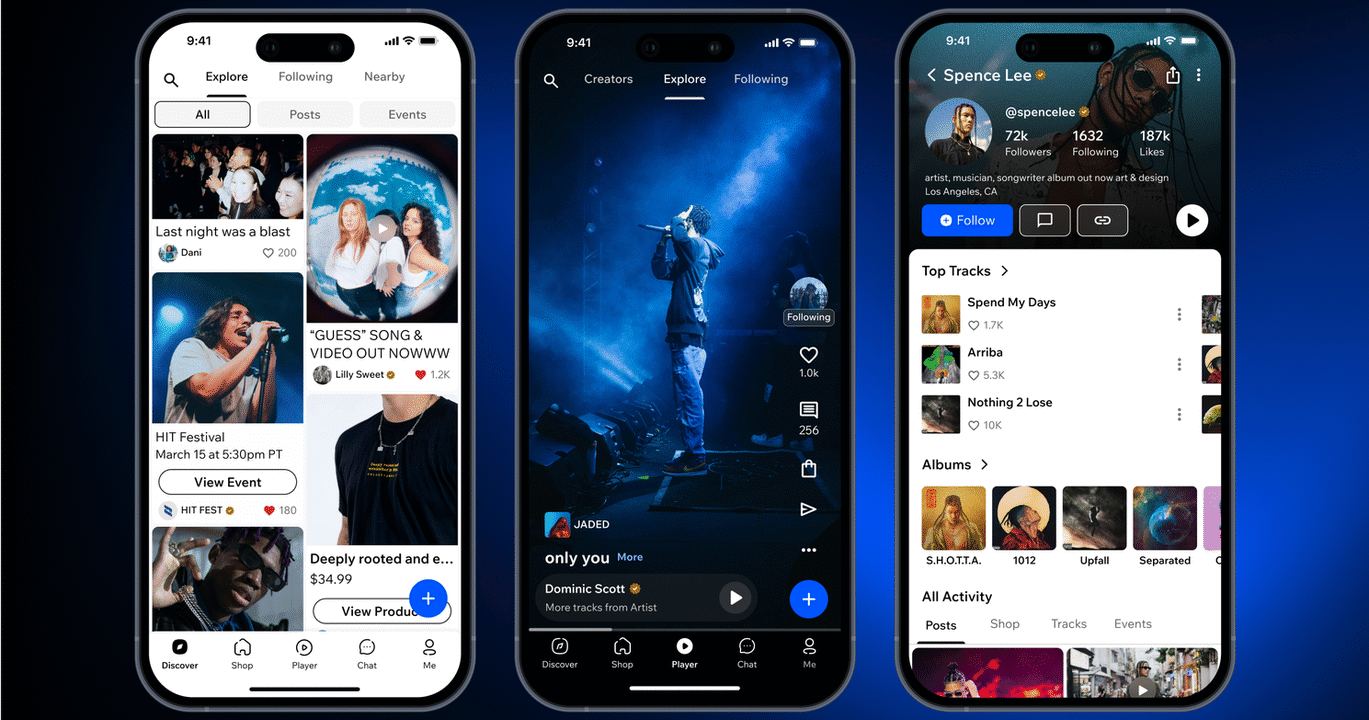
OpenWav, a newly launched platform co-founded by entrepreneur Jaeson Ma, is taking a direct aim at one of the music industry’s biggest flaws: the disconnect between an artist’s listenership and their income. With an all-in-one, mobile-first, direct-to-fan platform that empowers independent artists to generate income through ticketing, on-demand merchandise, exclusive content, and subscriptions. OpenWav wants to turn followers into customers and careers into livelihoods.
When considering the future of the music industry from a marketing perspective, it helps to break it down into three core pillars: distribution, consumption, and promotion. Today, anyone can distribute their music, and anyone can consume it. The barriers to entry are gone. But promotion, the ability to understand who is listening and reliably connect with fans to build a career, remains unsolved. A striking metric illustrates this gap: of the 12 million artists who uploaded music to Spotify in 2024, only 0.6% earned $10,000 or more in royalties.
The challenge in the music industry is that for most artists, streaming is the gateway to brand-building, which then enables monetization through ticketing, merchandise, brand deals, and subscriptions. Yet, without the music itself, these revenue streams wouldn’t exist. The difficulty lies in translating streaming metrics into direct fan relationships and sustainable income.
Aside from the nominal cost per stream, the inability to make a living as an artist is largely due to how fragmented the music industry remains. Since artists do not own the platforms on which their content is distributed or consumed, they lack the ability to connect directly with fans who are already listening. Additionally, they do not have access to the data required to understand who their core listener base is and take advantage of the opportunities to succeed. Especially the opportunities that AI-powered technology is now presenting. It is common to see an artist with 100,000 monthly listeners on Spotify have fewer than 10,000 followers on social media and lack a way to connect directly with their audience. OpenWav is built to help these “on-the-cusp” artists bridge that gap.
Over the past decade, there have been several attempts by many startups to break the last remaining barrier to entry with different offerings. Most loudly, Crowdmix raised $75 million and Utopia raised $300 million. The similarity exists in the fact that they were all trying to get all of the data across multiple revenue streams for an artist into one place. What makes OpenWav different?
The perspective of the captain at the helm impacts the success of the ship. Jaeson Ma’s personal mission is to build a bridge between Eastern and Western culture through media, entertainment, technology, talent, and content. Ma’s mission is pivotal to understanding his approach with OpenWav. This lifelong mission stems from Ma’s childhood, growing up between San Francisco and Hong Kong with his grandparents.
Ma brings extensive experience in the Asian-American music industry to this mission. He founded media company 88rising (originally CXSHXNLY), which was named “Label of the Year” in 2019 by NetEase, one of China’s largest music streaming platforms. He was also an early investor in Musical.ly, which became TikTok, and co-founded Stampede Ventures with Greg Silverman and Gideon Yu, which helped bring Crazy Rich Asians to the big screen.
In our conversation, Ma highlighted a cultural tectonic shift that has reshaped the dynamic between East and West. Historically, Western platforms influenced Eastern counterparts. Google influenced Baidu, Amazon influenced Alibaba, and Microsoft and ICQ influenced Tencent and WeChat. Today, the influence flows both ways. Eastern platforms like TikTok Shop, Shein, Temu, and AliExpress are disrupting backend supply chain e‑commerce inWestern markets by delivering factory-direct products and reshaping e-commerce and consumer behavior.
“OpenWav is the full convergence and integration of the best of Eastern and Western culture and technology,” Ma said. Its zero-inventory merchandise model draws from Alibaba and Shein’s supply chain innovations. Its music player is inspired by Douyin’s short-form discovery experience, and its chat function mirrors WeChat’s direct social commerce model. The all-in-one platform approach is similar to China’s Little Red Book, which has more than 300 million monthly active users. “The all-in-one model satisfies Gen Z’s need for a la carte solutions,” Ma explained, “rather than offering just one path to monetization.”
At the heart of the platform is OpenWav’s Central Control Station, a back-end hub where artists can manage their stores, music, events, content, and fan purchases in one place.
OpenWav Merchandise Feature
OpenWav
One of OpenWav’s most powerful features is enabling artists to launch and ship premium merchandise worldwide within minutes and with no upfront costs. Products are made only after purchase and are sourced from over 200 premium on-demand factories, covering everything from apparel to collectibles. Artists can generate album covers with AI-powered text-to-design tools and apply them across mobile-ready products. Orders ship to more than 30 countries within 7 to 14 days.
This model is already proving effective. Kevin Woo, a former member of K-Pop group U-KISS and the voice of Netflix’s K-Pop Demon Hunters, recently launched his solo R&B career on OpenWav. Within one hour, he generated $7,000 from a custom phone case drop. He went on to sell 2,000 VIP tickets for a release party in Koreatown, Los Angeles. Follow-up drops including a hoodie, poster, and water bottle tied to his single “Deja Vu,” brought total earnings to $25,000. One superfan alone was compelled to purchase 35 hats.
It’s worth noting that Kevin Woo is not exactly the target “on-the-cusp” artist OpenWav aims to serve, because his fandom is already devout and entrenched, regardless of the platform. The real barrier to promotion lies in helping undiscovered artists convert fans into buyers, and doing so at scale.
Looking ahead, OpenWav plans to ingest over 130 million tracks from global distributor 7digital, making nearly 80% of Spotify’s artists discoverable on the platform. This integration will also allow fans to purchase songs directly on OpenWav, with payments processed through 7digital.
Wyclef Jean’s involvement as Chief Music Officer underscores that OpenWav is as much about cultural leadership as it is about technology. The platform is also developing AI-powered tools that function like a virtual manager, agent, and marketer. These tools will leverage real-time data to help artists identify the right products, markets, and audiences. Features like “text-to-product” will allow artists to instantly design and launch merch drops and identify who to target and where.
At its core, OpenWav is not just a tech company. It’s a cultural movement. By blending the creative freedoms of the West with the platform efficiency of the East, it offers artists a new kind of agency: the power to own their narrative, their community, and their career.








